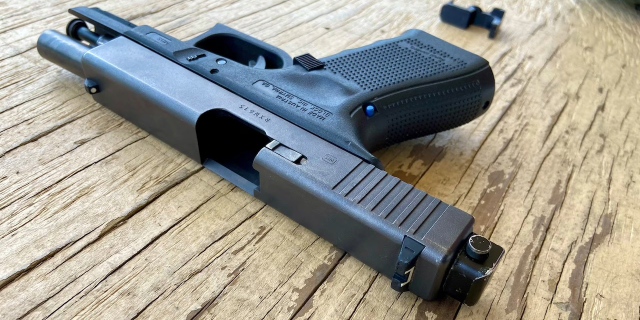Oregon gun bill that would raise possession age to 21, establish 72-hour wait splits lawmakers
Published 3:31 pm Saturday, March 29, 2025

- Senate Bill 243-1 would make possession of a "switch device" that turns a gun into a fully-automatic firearm a Class A misdemeanor. The Bureau of Alcohol, Tobacco, Firearms and Explosives now classifies such devices as machine guns, making them illegal under federal law under most circumstances.(Carol Robinson)
The political polarization on gun control came into stark view among members of the Senate Judiciary Committee after they heard more than two hours of testimony on a controversial omnibus bill that would institute a waiting period to obtain a gun, raise the legal possession age and ban rapid-fire switch devices in Oregon.
The hearing Thursday followed the release the day earlier of a new bill that reflects a wish list of stricter regulations from advocates who have worked for years to toughen Oregon’s gun laws.
Committee Vice Chair Kim Thatcher, R- Keizer, said she was generally opposed to gun control, arguing that most rules harm law-abiding gun owners and don’t reduce violence.
Sen. Mike McLane, R- Powell Butte, said he opposed having four significant gun control changes placed in one piece of legislation, not allowing a vote on each regulation.
He said he specifically objected to Senate Bill 243-1’s extended 72-hour waiting period before someone can pick up their purchased gun. Oregon currently has no mandated wait time.
The three other major provisions of the bill would raise the age from 18 to 21 to legally possess most guns other than certain hunting rifles and shotguns, ban switch devices that turn guns from semi-automatic to fully automatic weapons and expand the types of governing bodies that can bar people, including those who have concealed gun licenses, from carrying guns in certain public buildings and adjacent grounds.
McLane pointed out that voter-approved Measure 114 will already delay a gun purchase for up to 30 to 60 days to get the results of a criminal background check, take a safety course and receive a permit. (The measure has yet to go into effect, stalled by two years of legal challenges, though a separate bill this session would carry out requirements for a permit to buy a gun and limits on large-capacity ammunition magazines, if passed.)
SB243-1’s 72-hour wait would go on top of the wait for a permit, McLane said.
“What happens when somebody needs a firearm to defend themselves?” he asked.
Committee Democrats Sen. James Manning Jr., D- Eugene, and Sen. Anthony Broadman, D- Bend, voiced strong support for the bill.
Broadman called for the need to adopt stronger safety measures to secure government buildings to protect public officials, including judges, prosecutors, election officials, school board members, mayors and city or county commissioners, who are facing what he called an “undeniable rise” in harassment and threats simply for doing their jobs. Members of the public also deserve to feel safe in public places, he said.
“This is a recognition that in high-risk, high-tension public spaces like the ones we all work in — whether you’re in a courthouse or a capitol or city hall — the presence of firearms needs to be controlled,” he said. “Otherwise we risk intimidating the very people we are elected to serve. Firearms don’t belong in these spaces. They don’t belong here.”
In the Portland area, the Metro regional government wants to prohibit licensed holders from carrying concealed guns in and around the Oregon Zoo and the Oregon Convention Center, which it operates. Both attract millions of people each year, including young families and children, said Anneliese Koehler, Metro’s legislative affairs manager.
“We have struggled to balance legitimate rights of gun owners with the safety and comfort of the broader public at these often-crowded public venues,” she testified. “While most gun owners are considerate, occasionally we have a concealed handgun license holder who insists on open carrying in crowded public spaces. These are often spaces filled with families who have gathered for fun. We have received many complaints about such activities but are unable to do anything about it.”
Manning, a former police officer and Army veteran, said he simply doesn’t understand arguments against a 72-hour waiting period.
“Where do you have to go and purchase it right now that you can’t wait a couple more days?” he asked.
“A firearm is an instrument of death. It is not a toy,” Manning said. “I’m all about self-protection. I own firearms as well. But there is a time when we have to reconcile that with what is going on in America, what is going on in these classrooms. … It’s not the wild, wild West, where anybody can walk around carrying firearms.”
Gun rights proponent Brian McGregor of Salem called the red-shirted “Moms Demand Action” advocates a “radical special interest” group and urged lawmakers to consider the concerns of gun owners who live outside the state’s larger urban cities and counties.
Another speaker claimed without proof that activists with Moms Demand Action have to get their testimony approved from someone out of state before they can speak – which was quickly repudiated by Oregon group member Erin Riley.
“No one told me what to say,” Riley said, adding that Moms Demand Action was modeled after Mothers Against Drunk Driving. “We’re just a bunch of moms who had enough. We’re not led by outside agitators.”
Riley, also active in the national group Everytown Survivor Network, recounted how her son Daniel shot and killed himself in 2010. She found that he had searched for gun stores that day about 10:30 a.m., bought a gun by 12:30 p.m. and was dead by 1 p.m.
“So Senator McLane,” Riley said, “that’s how easy…”
McLane started to respond to Riley, but committee chair Sen. Floyd Prozanski cut him off, telling him, “No feedback.”
“But she directed it at me,” McLane objected.
“I know she did,” responded Prozanski, D- Eugene. “Just take it.”
KD Parman, principal of Portland’s Roosevelt High School, recounted how gun violence has harmed students from her school. A 16-year-old student was shot in the head last Sunday near North Portland’s Cathedral Park and is hospitalized, fighting for his life, she told the committee.
“I’ve lost count of the recent graduates that have been murdered or injured by gun violence,” she said. “I do know our Black students are disproportionately impacted. People ask what can we do? And that’s why I’m here. … There’s too many guns and kids have far too easy access.”
Multnomah County District Attorney Nathan testified about the rise of switch devices on the streets of Portland and surrounding communities.
Police seize them multiple times a month, he said. In the past month alone, he said, six guns with switches were seized in the course of criminal investigations in the Portland area, he said.
In 2021, a Rollin’ 60s Crips member used a switch when he fired into Silver Dollar Pizza in Northwest Portland and killed an innocent patron, noted.
Rep. Alex Skarlatos, R- Canyonville, countered that such switches are already illegal under federal law.
“So I don’t know what making them a Class A misdemeanor on the state level would do,” he said.
Jane Clemo, who identified herself as a home-based federal firearms licensee in Gaston, said women beg her for guns to feel safe and that the waiting period “buries me in red tape” and would harm her business while doing little to stop criminals from getting guns.
Amy Patrick, policy director for the Oregon Hunters Association, said she opposed the age restrictions in particular.
A provision banning semi-automatic shotguns with a three-shot capacity would prove detrimental, she said, because they’re used for hunting waterfowl and upland birds, which are entry points for new hunters.
The committee has a scheduled a work session on the bill next Thursday at 3 p.m.
Here’s more on SB 243-1’s provisions:
- Anyone under 21 could not possess a gun, raising the age from 18. Exceptions: 18-, 19- and 20-year-olds could still possess certain hunting rifles and shotguns. The restriction wouldn’t apply to police or active or reserve members of the military or National Guard.
- Switch devices and bump stocks that make guns fully automatic would be banned. Possessing either would be a Class A misdemeanor, which carries the highest penalties among misdemeanors.
- Gun dealers could not transfer a gun, unfinished frame or receiver unless they’ve received an approval number from state police that a buyer has passed a criminal background check and at least 72 hours have elapsed from when a dealer requested a background check and received the approval number.
- A “governing body of a city, county, district” or “any other entity that falls within the definition of ‘municipal corporation’ ” could adopt a policy, ordinance or regulation barring concealed handgun licensees from carrying guns within buildings or on grounds next to buildings owned or controlled by the governing body. Municipal corporation, as defined by state law, includes a city, county, special district, school or education service district or “public corporation” organized to serve a public purpose or receives public money.
Maxine Bernstein covers federal court and criminal justice. Reach her at 503-221-8212, mbernstein@oregonian.com, follow her on X @maxoregonian, on Bluesky @maxbernstein.bsky.social or on LinkedIn.






